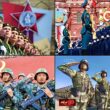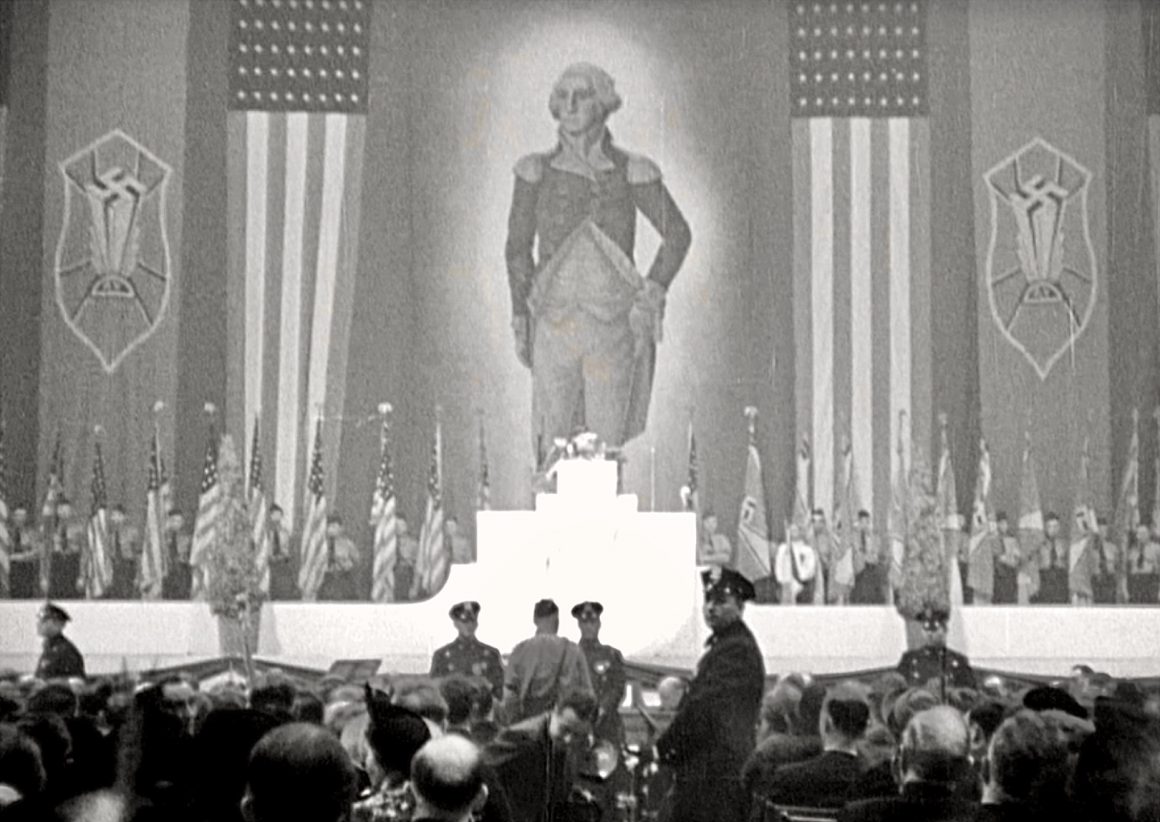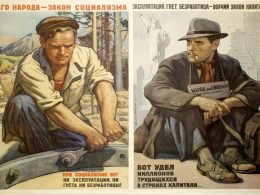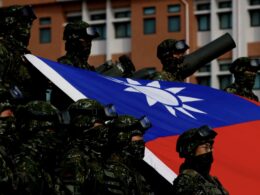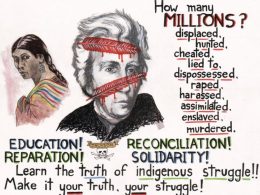Historically, the petty bourgeoisie are the social base for fascism. They’re the class that’s generally the most willing to serve as the fighting wing for the capitalists, to mobilize into paramilitaries that terrorize the working class into submission. But what about when the capitalists are successfully able to recruit members of the working class themselves into campaigns for violent suppression of class, anti-colonial, and anti-imperialist struggles?
This was what happened four days after the Kent State Massacre of 1970, where the National Guard fired on anti-Vietnam War protesters. In response to student demonstrations against the atrocity, two hundred New York City construction workers attacked the students at the direction of actors within the local AFL-CIO. They beat up the protesters, chased them through Manhattan’s financial district, stormed city hall, and threatened officials into raising the flag from half-mast (in honor of the Kent State victims) to full mast. They sang “The Star-Spangled Banner,” and got the police to take off their helmets in vacuous respect for U.S. imperialism. They attacked Pace College, smashing windows and beating more students, and attacked a nearby church that was caring for the injured.
Evidence indicates that U.S. patriotism was the central idea behind their actions. U.S. patriotism which was intensified by the assimilation of these largely Irish-heritage workers into the “American” identity. In Not a Nation of Immigrants: Settler Colonialism, White Supremacy, and a History of Erasure and Exclusion, Roxanne Dunbar-Oritz writes about the ideological forces which motivated the workers to commit this fascist terrorist attack. Dunbar-Oritz observes that the transition of Irish people from an oppressed class in America into oppressors, where the Irish came to disproportionately make up the police forces which enabled the violence, drove the attack and its glorification by reactionaries:
Patrick Buchanan, Irish American, then President Richard Nixon’s aid, wrote in a memo to Nixon that “these, quite candidly, are our people now.” Peter Brennan denied that the union [AFL-CIO] had any role in the mayhem, telling a reporter that “the union had nothing to do with it, the men acted on their own. They did it because they were fed up with the violence by anti-war demonstrators, by those who spat at the American flag and desecrated it.” He added that his office had received calls from all over the country praising the workers for their patriotism. It is now known that the Nixon administration initiated planning for the counterprotest with New York labor leaders and helped coordinate it and several others that month. Local shop stewards encouraged workers to join the protest, and in some cases offered cash bonuses. Brennan became secretary of labor in Nixon’s second term. The hard hat Brennan gave to Nixon is on display at the Nixon presidential library. When he had ceremoniously presented it to Nixon soon after the riot, Brennan said, “The hard hat will stand as a symbol, along with our great flag, for freedom and patriotism to our beloved country.”
It didn’t matter to these class traitors that the protesters killed at Kent State had been unarmed and nonviolent. It didn’t matter to them that the war these demonstrators had been protesting, and burning their precious flag over, was started through a false flag attack designed to manufacture consent for a genocidal anti-communist military aggression. They were obviously ignorant to all of these facts, and concerned only with a desire to shore up the benefits that the settler state had given to them by allowing their diaspora to be accepted as “white.” They had an anti-communist attitude as well, which related to their desire for the empire to continue slaughtering a people on the imperial periphery who were fighting for their freedom from foreign capitalist exploitation.
The rioters exemplified what Che Guevara meant when he wrote that “the workers in the imperialist countries gradually lose the spirit of working-class internationalism due to a certain degree of complicity in the exploitation of the dependent countries, and this at the same time weakens the combativity of the masses in the imperialist countries.” Because of these benefits that imperialism and settlerism gave them, they may have been fighting against their own class interests by attacking the anti-war protesters, but they were fighting for their interests as settlers in the imperial center.
Since the era in which Che wrote this, and in which that attack took place, those benefits from imperialism have mostly dried up as far as the U.S. working class is concerned. But they haven’t fully gone away, and the parasitic benefits of settlerism (which is to say internal imperialism) are still here for whites aside from those who’ve been utterly pushed into the economy’s peripheries. So the threat of that kind of fascism remains. Of the white workers who are susceptible to reaction being recruited into paramilitary armies for the bourgeoisie. The difference is that this potentially reactionary element is now diminished, due to the catastrophic impacts that neoliberalism has had upon working class people of all colors.
Therefore, communists shouldn’t act like it’s still 1970. Conditions in the U.S. have vastly changed in the last half-century, and the proletariat is more ripe for being successfully educated into revolutionary consciousness than ever. Back then around one in ten Americans viewed socialism favorably, whereas now it’s around four in ten. But fascism works by terrorizing the majority of the masses into submission to the capitalist state, and dividing the workers is an instrumental tactic in this campaign to prevent proletarian revolution. So we must be vigilant of all propaganda which seeks to replicate the attack of 1970, where so many settler working class people were successfully won over to join the side of reaction.
Pivotal to this propaganda is the essential argument which fascism makes to the workers under an imperialist settler state: that it’s in their best interests to ally not with the forces of decolonial socialist revolution, but with the forces of fascist warfare against the oppressed nations and their fellow workers. When one gains a revolutionary education, studying the ongoing history of how socialist states have raised the living standards of their people and given workers control over their workplaces, it becomes immediately clear that this argument is predicated on a lie. The lie that the U.S. workers stand more to materially gain from preserving imperialism than from building socialism. The benefits that imperialism gives the U.S. masses, which are increasingly meager even for the white proletariat, are tiny compared to what we would gain under workers democracy. The formation of a socialist federation of post-colonial nations, not a fascist project to preserve the settler capitalist state, is in our best interests.
The problem with Sakaism, the tendency of ultra-left anti-colonialists which emerged from J. Sakai’s famous polemic Settlers, is that it gives more ground to fascism’s argument than a material analysis indicates is reflective of reality. It claims that as neoliberalism continues to destroy the living standards of the white proletariat, these working class whites will fail to gain a revolutionary consciousness, and will instead revert to the fascist mentality behind the Irish construction worker riot. This is an anti-materialist argument. The facts that the colonial contradiction still exists, and that the white working class are still technically settlers, do not mean worker solidarity across racial lines isn’t possible. It’s absolutely possible.
What it requires is for communists to provide the workers with the revolutionary education needed to inoculate them against fascism’s lies. As Lenin wrote, “Our very first and most pressing duty is to help to train working-class revolutionaries who will be on the same level in regard to Party activity as the revolutionaries from amongst the intellectuals (we emphasise the words ‘in regard to Party activity’, for, although necessary, it is neither so easy nor so pressingly necessary to bring the workers up to the level of intellectuals in other respects). Attention, therefore, must be devoted principally to raising the workers to the level of revolutionaries.” This means not pretending that the workers who are patriotic for the United States are right for being so, but educating them on the historical context of settler-colonialism. This is how the proletarian movement can act in solidarity with the fight for self-determination by the oppressed nations. Because both fights are ultimately one and the same.—————————————————————————
If you appreciate my work, I hope you become a one-time or regular donor to my Patreon account. Like most of us, I’m feeling the economic pinch during late-stage capitalism, and I need money to keep fighting for a new system that works for all of us. Go to my Patreon here.



